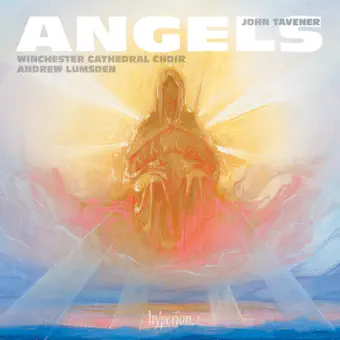mei 2019
Tavener: Angels & Other Choral Works
Winchester Cathedral Choir o.l.v. Andrew Lumsden
Geselecteerde werken van John Tavener, wiens muziek zowel een hemels gevoel als onze menselijke ervaring weerspiegelde, worden op bemoedigende wijze uitgevoerd door het Winchester Cathedral Choir.

Ik rond deze recensie af precies op de dag dat John Tavener 75 jaar zou zijn geworden. Zo'n jubileum zorgt ervoor dat je opnieuw nadenkt over wat in alle opzichten een opmerkelijke carrière was, en deze uitstekende nieuwe opname is een heel goede manier om dat te doen. Tavener had een lange en nauwe band met Winchester (en heeft dat nog steeds, in feite, in de vorm van het Tavener Centre), dus het was een bijzonder geïnspireerd idee om boekjes met aantekeningen te bestellen bij Martin Neary, de voormalige organist en Master of the Music, die de opdrachtgever en eerste uitvoerder was van zoveel werken van de componist.
Een voorbeeld hiervan is God is with us, besteld voor de kerstliederendienst van 1987. Ik moet zeggen dat ik dit nooit een van Taveners meest succesvolle werken had gevonden, maar deze uitvoering heeft me om twee redenen overtuigd. De eerste is dat tenor William Kendall zo'n geweldig werk levert met het sologedeelte, en de tweede is dat de onverwachte en dramatische inzet van het orgel hier volkomen overtuigend klinkt, wat alles te maken heeft met de manier waarop Andrew Lumsden het werk tempo geeft. Dit wordt gevolgd door twee werken die twee jaar eerder zijn geschreven, de eerste Hymn to the Mother of God en Love bade me welcome, beide uitstekende stukken geboren uit een unieke verbeelding. Alleen Tavener zou zoveel hebben gehaald uit een eenvoudig middel als de dubbelkorige canon in de Hymn, of hebben bedacht om Herbert op een manier te zetten die Bulgaarse gezangen suggereert.
Andere klassiekers van Tavener komen ook aan bod, met name Song for Athene, maar er wordt ook veel aandacht besteed aan latere werken, waaronder vijf anthems uit The Veil of the Temple (2002) en They are all gone into the world of light, een bewerking van Henry Vaughan uit 2011. Er zit een weelderigheid in deze werken, harmonisch gesproken, die over het algemeen ontbreekt in de eerdere stukken, maar Taveners eigen stem is desondanks altijd duidelijk aanwezig: ik heb er zelfs meer dan eens op gelet dat zijn stem duidelijk hoorbaar is in zijn muziek uit welke periode dan ook – de compositorische stem van Últimos Ritos is bijvoorbeeld absoluut dezelfde als die van Maria van Egypte. Eén stuk dat ik met veel plezier opnieuw hoor is Annunciation uit 1992. Dit werk is zo direct dat je zou zweren dat Tavener er daadwerkelijk bij was toen de aartsengel het nieuws aan Maria bracht. Het wordt gevolgd door een geweldige uitvoering van As one who has sleeping, opnieuw tot leven gebracht door het onberispelijke tempo en de fantastische mix van het koor (ademen ze ooit?). Dit is een demonstratie van wat jongens- en meisjeskoorzangers die samen zingen, kunnen bereiken. Een werkelijk prachtig verjaardagscadeau.

I am finishing this review precisely on what would have been John Tavener’s 75th birthday. Such an anniversary causes one to reflect anew upon what was by any standards a remarkable career, and this outstanding new recording is a very good way of so doing. Tavener had a long and close association with Winchester (and still does, in fact, in the form of the Tavener Centre), so it was a particularly inspired idea to commission booklet notes from Martin Neary, the former Organist and Master of the Music, who was the commissioner and first performer of so many of the composer’s works.
One such example is God is with us, commissioned for the 1987 carol service. I have to say that I had never found this to be one of Tavener’s most successful works, but this performance has won me over, for two reasons. The first is that tenor William Kendall makes such a fine job of the solo part, and the second is that the unexpected and dramatic entry of the organ here sounds utterly convincing, which has everything to do with the way Andrew Lumsden paces the work. This is followed by two works written two years earlier, the first Hymn to the Mother of God and Love bade me welcome, both outstanding pieces born of a unique imagination. Only Tavener would have extracted so much from a simple device as the double-choir canon in the Hymn, or thought of setting Herbert in a way that suggests Bulgarian chant.
Other Tavener classics appear too, most notably Song for Athene, but much attention is also paid to later works, including five anthems from The Veil of the Temple (2002) and They are all gone into the world of light, a setting of Henry Vaughan from 2011. There is a lushness about these works, harmonically speaking, that is generally absent from the earlier pieces, but Tavener’s own voice is nevertheless always apparent: indeed, I have been at pains to point out on more than one occasion that his voice is clearly audible in his music from whatever period – the compositional voice of Últimos Ritos is absolutely the same as that of Mary of Egypt, for example. One piece I am particularly pleased to hear again is Annunciation from 1992. Such is the immediacy of this work that you would swear that Tavener had actually been present when the Archangel brought the news to Mary. It is followed by a superb rendition of As one who has slept, once again brought alive by the impeccable pacing and by the fantastic blend of the choir (do they ever breathe?). This is a showroom demonstration of just what boy and girl choristers singing together can achieve. A truly magnificent birthday present.
